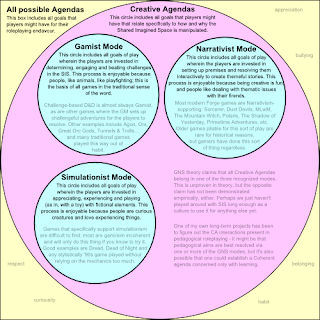 |
| This image screams Traveller. |
What is Traveller? Is likely to be another essay of mine. Suffice it to say, Traveller is a game about adventurers that travel between planets, usually in the hustle to make enough money for their next meal. The Empress Marava, and the Spinward Marches are the core of traveller. The yawning chasm in capability between a character in battledress and one without isn't. The glaring lack of acknowledgement of the digital revolution in its canon isn't. (Traveller's technology base is more like Cowboy Bebop or Firefly than Star Trek or Shadowrun.)
Roleplaying is a vast canvas of cooperative storytelling, usually of an ascent to greatness. Within that canvas, though, the several great genres exist as what others would call Metagames: the core spirit of what it means to be playing Shadowun, Pathfinder, or Dungeons and Dragons. I propose that The sort of tropes & mcguffins that make up the bread and butter of these games isn't the metagame, it's the game itself. After all, the first rule at the front of all the Codices of Mechanical Resolution is (or should be) 'Take or leave any rules as you see fit among your group to achieve a fun experience.' Implicit in Rule Zero (which I think players have some claim to as well) is "have fun in this genre."
The important thing to point out is that 'genre' is the shared zeitgeist at your table of that you're playing. When you're thinking about introducing an action into the game, as the player or the DM, think about how it will be fun, for everyone. Think of how it fits into the Genre, and think of how it expands your table's current genre through evolutionary increment (Macgyver's agility between action, intrigue, drama, and after-school-special, while remaining true to concept, might be an inspiration in this respect). Invite your fellow PC's into the action (and don't waste a half hour on a scouting trip as the rogue). As the DM, invite PCs to take part in politicking (if that's part of your game) by attaching PCs to ethnic or social groupings, and then place PCs in positions as heralds and tribunes for those groups.
Talking about the action is not the action. Just like boring dialogue about what to do next can be replaced in a TV show to a cut to the beginning of the plan, keeping the audience in the dark, (and in suspense) so it is that you can suck up the game time talking, rather than acting.
The 'players plan their attack' time, I find, goes better when I simply say "I'm getting a coffee guys, when I come back in ten we'll cut to your assault on the keep.' This tends to be fun, as you can reward players with good plans by leaving the monsters hapless. It also seems that whenever I'm at the table, I just slow it down, the same way that an off-camera player or a split party would.
Of course, the GM is the usual culprit for this kind of time wasting that isn't actually part of the game. The long history lecture, the exposition through dialogue (rather than action or, better, adventure), the boring NPC bantering on about details of the world only the DM cares about... Are also Not Core to the Game. There are also mechanical challenges that aren't core to the spirit of the game--covered in more detail in part II.
(for now, recall how tiresome it is to wade through the masses of level 1 undead and orcs that many DMs fill BBEG's castles with for realism; also recall how the PCs are total badasses and the DM had full discretion to accurately roleplay the chumps and have them stone scared by the arrival of the Teleport Commando Action Force (TCAF).
While we don't have the luxury of a cutting room, all of these scenes would be cut from a tight television or film script. Why? Because they didn't bring the ratings up; they weren't core to the game (err...show). I'm not saying go all out here--but notice how the Temporal Cold War plot in Enterprise is introduced through Daniels, when he places Archer in an uncomfortable prisoner's dilemma. In that (surprisingly good for Star Trek's worst outing) episode, the exposition was also the action as Archer was left conflicted over which unknown faction to trust.
 |
| Traveller. It's like this. I think... |
For the love of the game, don't do these things. Find ways to avert them. I'm proud to say that I've played impulsive characters that got themselves killed demonstrating how tiresome sitting in a council room can be.
PS, I'll likely end up being called a Heretic for suggesting that Rule Zero is at all the province of the players. Rest Assured, I'll upset my timetable set down in "A change in the Weather" to include an exploration of this prospect.







